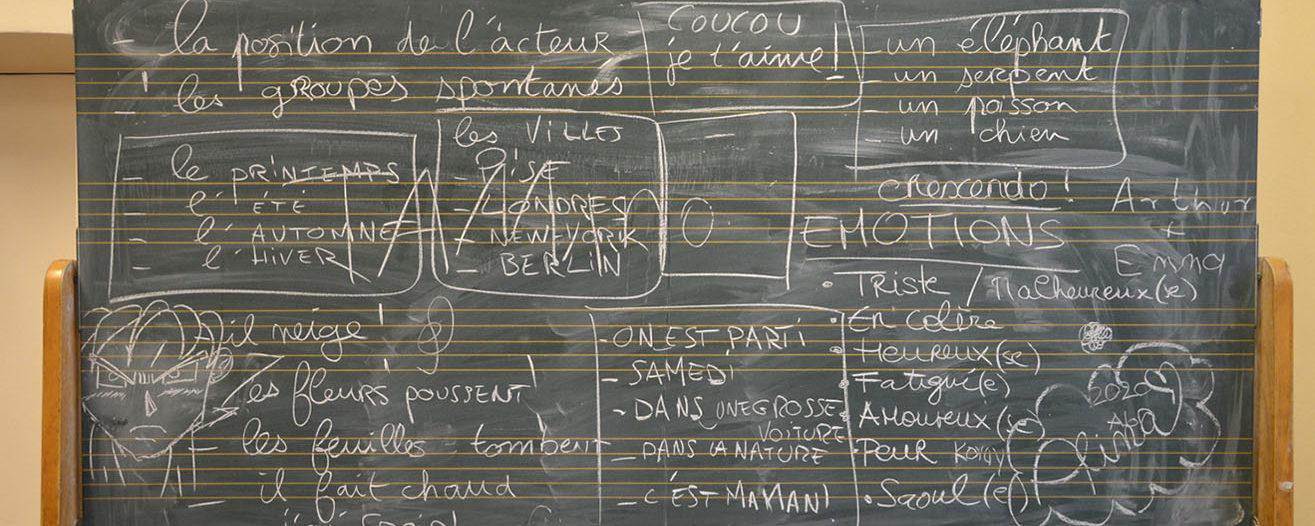
THEALINGUA® is active in research in the field of innovative pedagogy for teaching and learning a foreign language and culture. This multidisciplinary action research combines the fields of educational science, language didactics and performing arts/theatre practice.
Brief overview of the disciplines of theatre, pedagogy and language didactics covered by THEALINGUA
THEATER // Our practice is part of a constellation of contemporary theatre in which thinking about, making and transmitting theatre are the three pillars of artistic research. We come from a line that includes Jacques Copeau, Ariane Mnouchkine, Peter Brook, Eugenio Barba, Jacques Lecoq, Alain Knapp… Each in his own way embodies a theatrical style that shines first and foremost through the body, the collective and the encounter with others.
PEDAGOGY // In keeping with a tradition of popular education, Thealingua’s work is based on project-based pedagogy. This pedagogy comes from active teaching methods (Freinet, Montessori, etc.) and considers each person as a global being, a being made up of his or her physical, intellectual, social and artistic particularities. It is also a pedagogy based on cooperation, where the commitment of all those involved around a common project is necessary for its realisation, Sprachdidaktik und darstellende Kunst/Theaterpraxis.
LANGUAGES // Our approach to language teaching is inspired by the Council of Europe and the CEFR (Common European Framework of Reference for Languages). In today’s society, where there are more and more opportunities for mobility, particularly in the workplace, languages need to be taught in this context of co-construction. That’s why, since 2005, the Council of Europe has been recommending that language teaching and learning be based on an action-based methodology that involves practical activities in the classroom. We carry out projects using efficient languages on and around the stage.
Diagram: towards the pleasure of a foreign language
Group dynamics / Confidence in the facilitator, in each other, in yourself / No mistakes or failures, only appreciation / Kindness / Pride in quality
This process is based on the pleasure of being together in a project. To get to grips with the foreign language and experience the pleasure of it, we rely on tools, knowledge and know-how that come from the theatre (but which we also find in language teaching and didactics): bodily expression, teamwork and commitment.
Diagram: towards the pleasure of a foreign language
Group dynamics / Confidence in the facilitator, in each other, in yourself / No mistakes or failures, only appreciation / Kindness / Pride in quality
Research projects in which THEALINGUA has taken part
Master en cursus intégré – Pädagogische Hochschule à Freiburg et INSPE de Colmar
La pédagogie du théâtre en cours de langue étrangère à l‘école primaire – Perspectives de différents acteurs de la pédagogie du théâtre.
Auteur : Cécile Grabowski
2022
LIRE – TÉLÉCHARGER LE MEMOIRE PDF
Master Sciences du langage, PREFICS, Université Rennes 2
La pratique théâtrale en classe de FLE : Déblocage de la parole à travers la libération du corps et le travail en collectif.
Auteur : Hamza Mabsout
2022
LIRE – TÉLÉCHARGER LE MEMOIRE PDF
Master Français Langue Étrangère, Université Catholique de l’Ouest, Angers
Le théâtre d’improvisation adapté à l’enseignement/apprentissage des langues : Analyse de trois méthodes contemporaines et perspectives de terrain.
Auteur : Maxime Bioteau
2020
LIRE-TELECHARGER LE MEMOIRE PDF
Master Sciences du langage, Université Lille 3
Enseignement du français langue étrangère par les pratiques théâtrales : élaboration et mise en place d’un dispositif d’évaluation alliant compétences théâtrales et compétences langagières.
Auteur : Nina Denat
2016
LIRE-TELECHARGER LE MEMOIRE PDF
Master Didaktik der romanischen Sprachen und Literaturen, Freie Universität
Im Darstellenden Spiel Französisch lernen – Theaterpädagogik im spät einsetzenden Fremdsprachenunterricht Französisch: eine Fallstudie.
Auteur : Knut Heidelk
2015
LIRE-TELECHARGER LE MEMOIRE PDF
Communication IDEA, Congrès mondial des acteurs de l’éducation artistique, Paris
Le corps qui improvise, vers l’appropriation d’une langue étrangère.
Auteur : Marjorie Nadal
2013
LIRE-TELECHARGER L’ARTICLE PDF
Article écrit pour la revue LANGAGE, Université de Montpellier, non publié
S’exprimer dans une autre langue. Théorie et pratique en scène.
Auteur : Marjorie Nadal
2009
LIRE-TELECHARGER L’ARTICLE PDF
Master en Didactique des Langues, Université de St-Etienne
Les enjeux de la construction identitaire de l’individu en apprentissage d’une langue vivante étrangère, le français. Une approche par le corps mis en situation dans l’atelier ‘théâtre et langues’.
Auteur : Marjorie Nadal
2008
LIRE-TELECHARGER LE MEMOIRE PDF
Communication Congrès des professeurs de français en Pologne, Pulstuk
S’exprimer dans une autre langue
Auteur : Marjorie Nadal
2008
LIRE-TELECHARGER LA PRÉSENTATION
RÉFÉRENCES
Bibliographie et sitographie sur les pratiques théâtrales en cours de langue, balisage du champs théorique et activités pratiques.